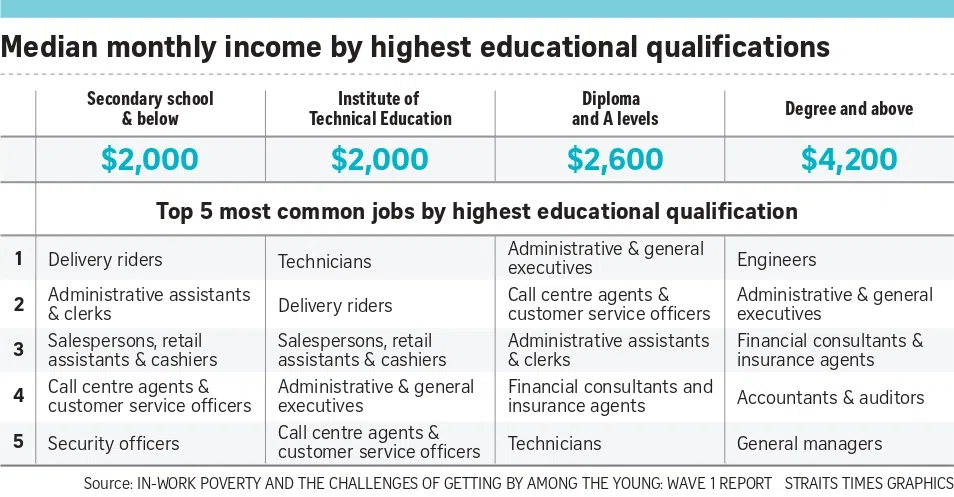University grads’ median pay is $4.2k, double the $2k of those with ITE, secondary education: Study
Sign up now: Get ST's newsletters delivered to your inbox

The pay for university graduates is 62 per cent higher than the median salary for those with diploma or A-level qualifications.
ST PHOTO: LIM YAOHUI
SINGAPORE - Singaporeans in their 20s and 30s who have a university degree or post-graduate degree earn a median salary of $4,200 a month – more than double the $2,000 that those with secondary and lower education and those with Institute of Technical Education (ITE) qualifications earn.
The $4,200 figure for university graduates is also 62 per cent higher than the median salary of $2,600 for those with diploma or A-level qualifications, a new large-scale study has found.
Associate Professor Irene Ng of the National University of Singapore (NUS) social work department, the principal investigator of the study conducted by 18 researchers, described the wage premium of a university degree as substantial.
She said: “We value paper qualifications a lot.”
In October, Deputy Prime Minister Lawrence Wong said Singapore places too much of a premium on jobs that require cognitive abilities
This premium placed on intellectual jobs – or “head work” as Mr Wong described it – is seen in the growing divergence in the starting pay of ITE, polytechnic and university graduates. The median starting salary of a university graduate is now almost twice that of an ITE graduate, Mr Wong said, adding that this earnings gap increases over their lifetimes.
He said: “We must move away from preconceptions that academic success should be prized above all others. Instead, we must respect those who labour with their hands and hearts, and confer upon them the same status as other paths.”
Prof Ng said she did this study as her past research found that many of the low-income families receiving government financial aid repeatedly ask for help, and one reason is that their wages are too low. Besides, there is a lack of policy and research attention on young Singaporeans who are working but earning low wages, whom she calls the young working poor.
Said Prof Ng: “If we don’t deal with the challenges they face, they will become the future poorest of the poor in need of government assistance.”
Her team interviewed 1,905 Singaporeans aged between 21 and 38 to find out the challenges they face at work, among other issues. From October 2020 to March 2021, the team went knocking on doors, interviewing respondents living in four-room or smaller HDB flats.
While the research is still ongoing, Prof Ng presented the first set of findings on Oct 29 at an event to mark the International Day for the Eradication of Poverty. Conversations Reimagined: Working Also Not Enough was organised by Julie’s The Best of You, which is the social movement of Julie’s Biscuits, and social service agency AMKFSC Community Services. It was held at JustCo@Marina Square and its audience included the public.
The key findings of the study, which is the first nationally representative research on the young working poor in Singapore, are:
– The three categories of most commonly held jobs for degree holders are engineers; administrative and general executives; and financial consultants and insurance agents. Meanwhile, the three most commonly held job categories for those with secondary and lower education are delivery riders; administrative assistants and clerks; and salespeople, retail assistants and cashiers.
– Low-wage workers were hit harder by the Covid-19 pandemic. Among the group, 35 per cent suffered from job disruption such as retrenchment or they quit their jobs, and 19 per cent experienced income loss. Of those with higher wages, 21 per cent suffered job disruption, while 4 per cent saw an income loss.
Following the definition by the Manpower Ministry, low-wage workers refer to those in the bottom 20th percentile of wage earnings, which was $2,340 a month for full-time work in 2020. Higher-wage workers refer to everyone earning above the 20th percentile.
– Those who are better educated have jobs with better working conditions. They get more work training, have better work environments and experience less job insecurity.
– 75 per cent of low-wage workers did not work remotely at all, compared with 41 per cent of those with higher wages.
– 10 per cent of the respondents have more than one job.
– More low-wage workers have symptoms of anxiety, such as having trouble sleeping or being particularly irritable, compared with those earning higher wages.
Prof Ng said the study’s findings threw up various issues for policymakers, companies and community groups to deliberate over.
For example, the promotion of remote work arrangements may not benefit many low-wage workers whose jobs require them to be at their workplace.
There is also the need to think about improving the training opportunities and pay for low-wage workers. Mindsets also have to change among employers to focus more on work performance and not just paper qualifications.
“We have interviewed some women in administrative jobs who are good at their work, but they said it is difficult for them to be promoted as they do not have a degree,” Prof Ng added.
Recent initiatives to boost the pay of low-wage workers, such as the expansion of the Progressive Wage Model to more sectors and the expansion of the Workfare Income Supplement Scheme to include younger workers, are welcome, she said.

The Progressive Wage Model is an industry wage ladder that sets out the minimum pay and training requirements for workers at different skill levels. From 2023, Workfare will be expanded to include those aged between 30 and 34.
Nora (not her real name), 33, used to work as a waitress, earning $2,400 a month. The O-level certificate holder saw her pay cut by 30 per cent during the circuit breaker in 2020 when dining in restaurants was not allowed and many of her colleagues were axed.
The mother of a two-year-old girl quit her job in late 2021 as she was unable to manage the stress of being an unwed single mother, as well as the difficulties she faced at work. She is now working as a freelance bartender and also getting government financial aid. She said: “Money is a constant worry.”



